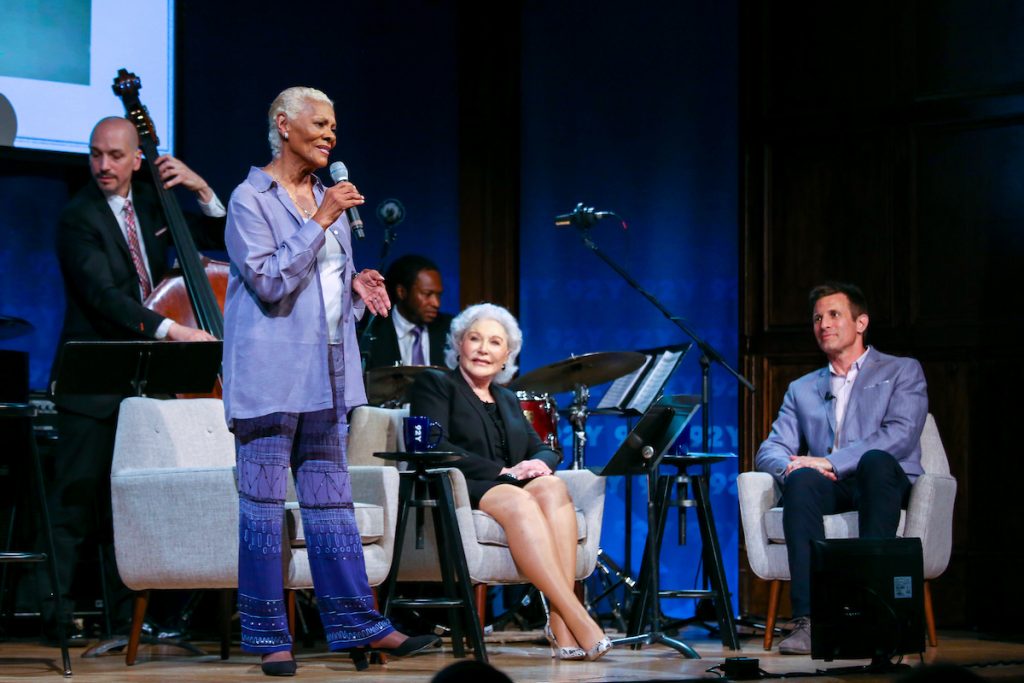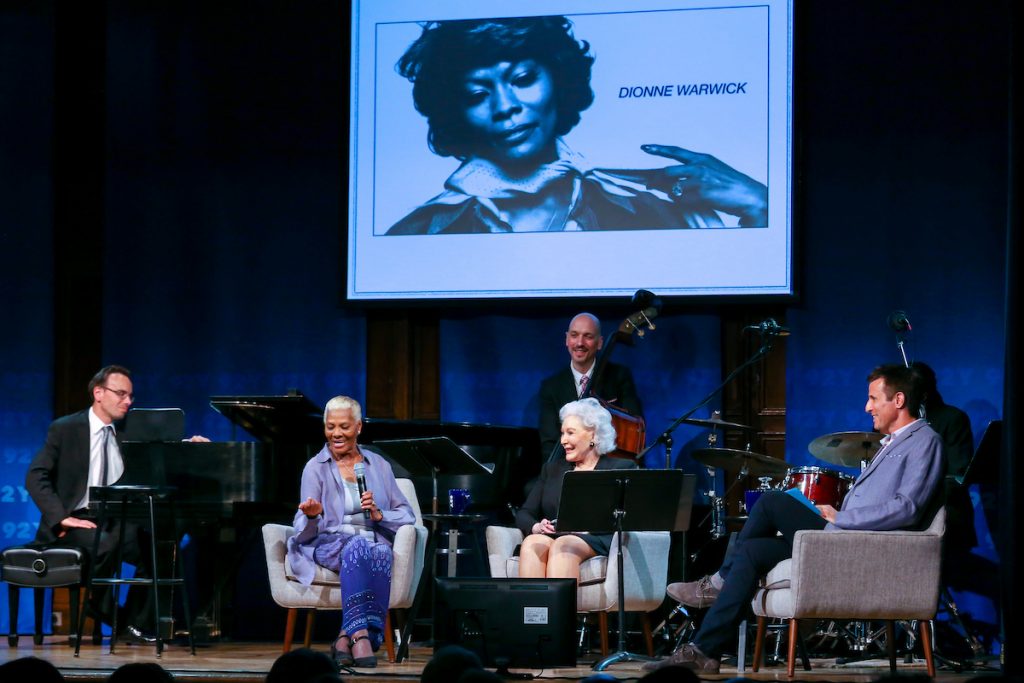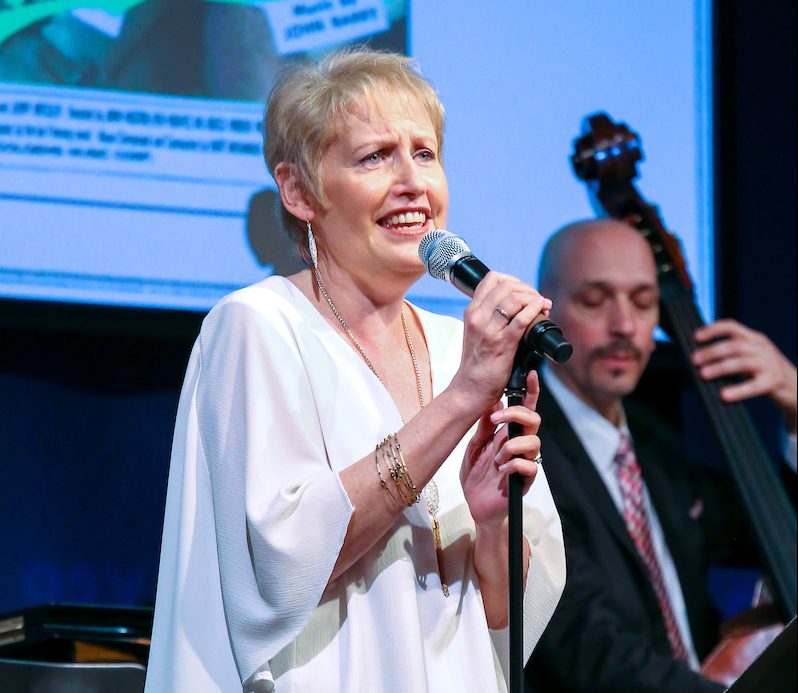
by Martha Wade Steketee
We make our way to the second floor Buttenwieser Hall at the 92nd Street Y on a sultry June evening without benefit of functioning elevators. Our goal: an upper floor concert hall in which we are promised recollections of the life and legacy of lyricist Hal David in words by his widow Eunice David and in song by assembled guest artists. We are rewarded for our efforts with stalwart musicians, two stunning vocalists, an able moderator, and David’s widow, all of whom deliver a warm and wonderful visit with our cultural memories and a charming life.
I expect a gentle trip down memory lane, and receive a reminder that the music of this lyricist and his collaborators is in our cultural DNA. We gather to honor an extraordinary talent, and are reminded along the way how his creations bind us together individually and culturally though moments shared and tunes for which we can deliver (most) lyrics from beginning to end, from “What’s New Pussycat” to “Walk on By” to “Blue on Blue” to “Close to You” to “One Less Bell to Answer.”
Moderator A.J. Hammer guides Eunice David along prepared themes with sequenced slides, with a few unprepared discussion topics. There are stories about how previously-married Eunice met previously-married Hal (on a tennis court, introduced by mutual friends), her realization of his musical contributions to the cultural set list of the middle 20th century, and their worldwide travels related to Hal’s work with ASCAP. We meet them as a couple, and get to know Eunice as our guide, before we learn about Hal David the Brooklyn boy whose older brother the songwriter gave him the image of this professional possibility.


David’s stint in a songwriting unit during World War II service introduced him to lifelong colleagues including actor Maurice Evans, and writer/performers Carl Reiner and Alan Ludden. The unit wrote and performed in shows all over the South Pacific, and allowed him to hone songwriting skills he’d use when he returned home. His 1946 double entendre gem “Horizontal” drew upon his service experience with the lyric “I just want to stay horizontal.” He thought it was the simple story of an exhausted soldier who just wants to sleep while others read other meanings. David’s career really took off when he was matched up with songwriter Burt Bacharach at the Brill Building. We hum Burt’s tunes, Eunice reminds us, but the lyrics evoke the pictures in our minds.
Eunice shares Hal words of wisdom. For example, success is a salve: “There’s nothing wrong in a songwriter’s life that a hit couldn’t cure.” And humility is a virtue: “There’s nothing like a flop to cure a swollen head.” Eunice recalls that Hal’s home office desk was piled high with books and papers until he was ready to get down to work and cleared everything away. “it was his way of clearing his mind.” And reflecting on the differences between writing for pop singers versus writing for film (recall Bachrach and David won an Oscar for “Raindrops Keep Falling on My Head” in Butch Cassidy and the Sundance Kid as well as tunes for Alfie, Moonraker, On Her Majesty’s Secret Service, and others). Eunice quotes Hal as underscoring that you “write for the eye as well as the ear.”
Hal David’s lyrics come out of a deeply observant and romantic mind, illustrated by the backstory of several tunes. For example, “One Less Bell to Answer” was inspired by a chance comment by a London host. Eunice points out that Hal was always trolling for words and phrases for future tunes. “Don’t bother ringing the bell,” the host instructed Hal, “it will be one less bell for me to answer.” There are stories about performers who found Hal David: e.g. the Carpenters and “Close to You”; a single excursion into a classical-country western mashup for Julia Iglesias and Willie Nelson “To All the Girls I Loved Before” (that we enjoy on video); and the David-Bachrach team’s long-term and enduring relationship with Dionne Warwick.


Liz Callaway is first to perform, accompanied by a musical ensemble led by music director Tedd Firth, with Phil Palombi (bass) and Mark McLean (drums). Callaway recalls that she was unaware that there was a separate lyricist when she first heard a Bacharach and David song, though it was the songtrack of her childhood. “Now as a singer,” she muses, “It’s all about the lyrics.”
Callaway delivers sweet and potent versions of several tunes. “The Look of Love” in a bossa nova rhythm—Ted Firth’s power on the keys underscoring Callaway’s quiet, controlled, loving treatment of the gentle love song. A set of somber love songs of tunes from Promises, Promises: “A House is Not a Home,” “The Look of Love,” and “I’ll Never Fall in Love Again,” reminds us of the potent hits from that recently revived show. “99 Miles From LA,” a big hit for Johnny Mathis, concludes the Callaway set, with the glorious yearning lyrics evoking a lover on the road home: “I want you, I need you, please be there.”
As a final extended treat, Dionne Warwick enters—almost too much history and combined cultural memory for any stage, but she is there to share the love as a participant in the legacy and as a fan of Hal David’s work. Between 1962 and 1968, we are reminded, Warwick recorded 56 singles by David and Bachrach. In their triumvirate, she remarked, David was the calming influence, and her respect for him is palpable. “If you didn’t have him doing what he did,” she noted, “you’d be humming.” His personal style was self-effacing. “He epitomized gentle-man,” she summarized.
Warwick concludes the evening by leading the audience in several choruses of “What the World Needs Now.” The rich chords of the musicians and the singers, on stage and in the audience, fill our hearts, as the evening’s stories have filled our minds.
Magic Moments: An Evening Remembering Hal David. Took place Monday June 12, 2017 at 8:30 pm. at the 92nd Street Y, Buttenwieser Hall (Lexington Avenue at 92nd Street). www.92y.org/event/remembering-hal-david
Photos: Michael Priest Photography


















